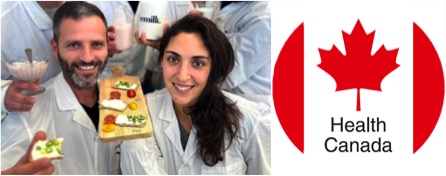A company that makes “animal-free” milk and milk products has got the green light from Health Canada.
In a news release today, Israeli startup Remilk, which uses the tagline “Real Dairy. No Milk,” announced it had received a ‘No Objection Letter’ from Health Canada. This will “open the door for use of Remilk’s protein in a variety of products with the same taste and texture as milk, ice cream, yogurt, cream cheese, and more,” the company said.
According to Remilk’s website, its products are developed using copies of the gene responsible for production of milk protein in cows. The gene is inserted into yeast, and fermented “where it multiplies rapidly and produces real milk proteins, identical to those that cows produce.”
The proteins are combined with vitamins, minerals, and “non-animal” fats and sugars, which produces products free from cholesterol or lactose, the company said.
This lets “consumers to enjoy the taste of the dairy they love, without dairy’s environmental and health-related drawbacks,” said Remilk co-founder and CEO Aviv Wolff in today’s news release.
Canada joins the U.S., Israel and Singapore in giving Remilk the go-ahead.
“Canada is an important market for us,” Wolff said. “We are proud to be the first to enter with an opportunity to deliver an unparalleled dairy experience for Canadians.”
While Remilk claims to be the first of its kind to get Health Canada’s approval, it’s one of several around the world.
For instance the Perfect Day company, which sells to the American market, was founded in 2014 and got U.S. regulatory clearance in 2019. Its products are made via an enzyme-producing fungus developed to produce specific proteins, Perfect Day’s website says.
However, “the synthetic milk industry must grow exponentially before it becomes a sizable threat to animal-based dairy,” wrote researcher Milena Bojovic in a 2022 article published in The Conversation.
Significant capital and investment in research and development, along with new manufacturing infrastructure like fermentation tanks, will be needed, she wrote.
Conventional dairy production isn’t going away any time soon, Bojovic wrote, however she suggested the sector should realize it’s “on the cusp of pivotal change” and should maximize its social benefits while minimizing its environmental drawbacks.
Source : Country guide Feb 6th 2024

